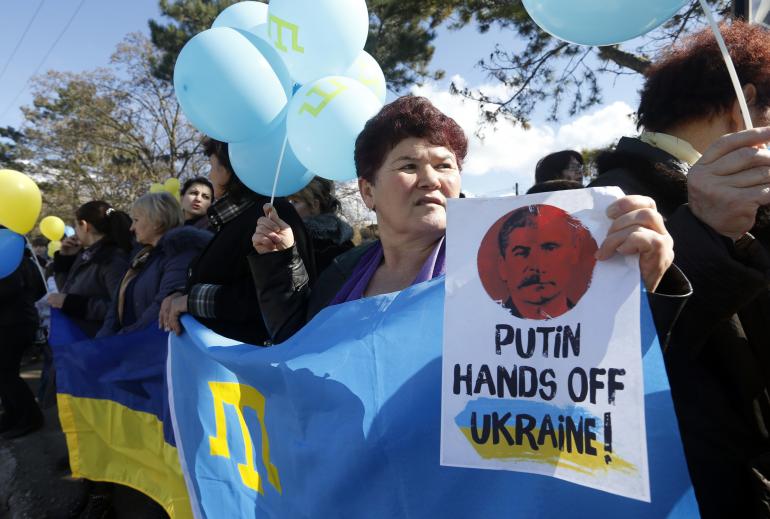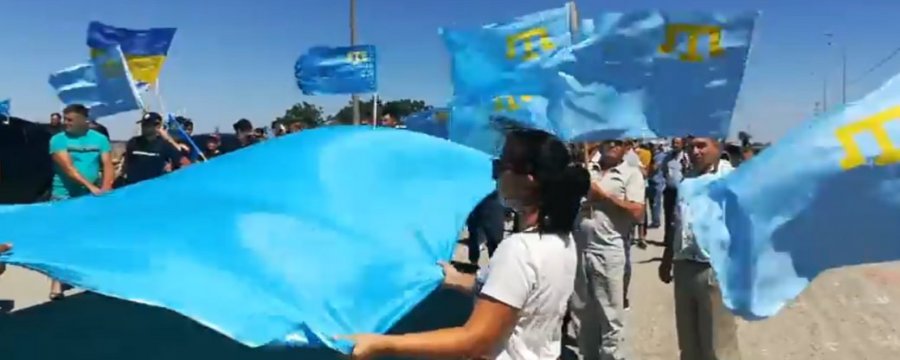Ukraine passes crucial law that Putin compared to a weapon of mass destruction

Ukraine’s Verkhovna Rada has adopted a Law on Indigenous Peoples whose critical importance has been demonstrated over recent weeks by the rage it aroused from Russian President Vladimir Putin. The latter has likened the law’s effect to that of a weapon of mass destruction. Although Putin provides a totally implausible reason for such alarmist predictions, the bill is of huge significance in demolishing lies standardly used by Russia to try to justify its invasion and annexation of Crimea. While there have been warnings that much more is needed, the bill has been welcomed as helping to defend the rights of the main indigenous people of Ukraine, the Crimean Tatars, and as an important step to ending Russia’s illegal occupation of Crimea.
Draft Bill No. 5506 on the Indigenous Peoples of Crimea was tabled in parliament by Ukrainian President Volodymyr Zelensky on 18 May this year and marked as urgent. The timing was no coincidence, with Zelensky having first spoken of the bill in his address to the nation on the day when Crimean Tatars and all of Ukraine remember the victims of Stalin’s 1944 Deportation of the entire Crimean Tatar people from their homeland.
On 1 July, Ukraine’s lawmakers heard calls to support the bill from, among others, Mustafa Dzhemilev, Ukrainian MP and veteran leader of the Crimean Tatar national movement. Just six months old at the time of the Deportation, Dzhemilev was again exiled from his homeland shortly after Russia’s invasion in 2014. In addressing people outside parliament after the vote, he promised that “we will return” and reiterated that “Crimea is Ukraine”.
The draft bill was, exceptionally, passed in one day, both as a basis, and then in its second, and final, reading, with almost 100 votes more than the minimum required. . The only faction in the Verkhovna Rada who did not support it was the pro-Russian ‘Opposition Platform for Life’ party. Since there were absolutely no votes against the bill, presumably they were the 5 who abstained and 15 who did not vote.
Anton Korynevych, the President’s Representative on Crimea, is surely right in calling this “a historic day”, but it is one that is long overdue. 25 years after the adoption of Ukraine’s Constitution, lawmakers have only now provided the legislation to regulate the articles of that Constitution which refer to both indigenous peoples and national minorities.
The authors of the bill closely followed international standards, including in the definition of indigenous peoples of Ukraine. These are specified as “an autochthonous ethnic community formed on the territory of Ukraine and having its own language and culture; having traditional, social, cultural and representative bodies; identifying itself as an indigenous people of Ukraine; constituting an ethnic minority within its [Ukraine’s] population; and not having its own state formation beyond Ukraine”.
According to this definition, the three indigenous peoples of Ukraine are the Crimean Tatars; the Karaits and the Krymchaks (the latter two are extremely small groups, also from Crimea). The bill guarantees these indigenous peoples collective and individual enjoyment of all cultural, education, linguistic and other rights in accordance with Ukraine’s Constitution and legislation; all human rights as per general international rights documents and pursuant to the UN Declaration on the Rights of Indigenous Peoples.
The bill also defines the legal status of representative bodies of indigenous peoples, including the issue of their representation in the Verkhovna Rada and internationally. This is of great importance with respect to the representative bodies of the Crimean Tatar people: the Qurultay, or National Congress, and the Mejlis, its representative body, responsible for taking decisions between sessions of the Qurultay. The Mejlis and its leaders were unwavering in their support for Ukraine’s territorial unity and opposition to Russia’s invasion, and called on all Crimean Tatars and other Ukrainians to boycott the pseudo ‘referendum’ on 16 March 2014. It was undoubtedly for these reasons that Russia began persecuting individual Crimean Tatar leaders, such as Mustafa Dzhemilev; the current Head of the Mejlis, Refat Chubarov; his First Deputy Akhtem Chiygoz and Ilmi Umerov, and then banned the Mejlis, claiming it to be ‘extremist’. It has now, for four years, ignored an express order from the UN’s International Court of Justice to withdraw that ban.
p>
Ukraine has, albeit belatedly, joined the UN Declaration on the Rights of Indigenous Peoples. This specifically prohibits any military actions or bases, or occupation without the consent of the indigenous people, as provided by their representative assembly.
Russian rage
This is probably the logical point at which one should consider Russia's aggressive and, at times, quite rather hysterical reaction to the draft bill. As reported, on 9 June, Putin claimed in an interview that the bill “reminded him” of Nazi Germany, that it divided people into “indigenous, first-class and second-class people and so forth”. He made various, highly manipulative, comments, such as suggesting that the words of the law “that indigenous peoples cannot be discriminated against” was somehow suggesting that non-indigenous peoples could. On 30 June, he went even further in an interview in which the leader of a country which has been waging undeclared war against Ukraine for over seven years, claimed that “Ukrainians and Russian are one people”.
He asserted that the present leaders of Ukraine are clearly hostile to Russia. “Otherwise, how can you explain a law where Russians are a non-indigenous people? What will this lead to? Some people will simply leave”. He then compared these ‘consequences’ with the effects of the use of a weapon of mass destruction since, he claimed, the law would lead to a general reduction in the overall number of Russians.
It should be stressed that this is conscious manipulation since Putin cannot be unaware of the fact that, according to Russian legislation, Russians could not possibly be considered an indigenous people of Ukraine, nor Ukrainians an indigenous people of the Russian Federation. Russia is becoming increasingly isolated in adhering to an old-fashioned definition of indigenous peoples, according to which these are small groups (up to 50 thousand people) who live their original traditional lifestyle and on traditional territories. This deviates radically from the much broader definition, seen in the International Labour Organization’s Indigenous and Tribal Peoples Convention from 1989 and the UN Declaration on the Rights of Indigenous Peoples. The definition offered in Ukraine’s bill on indigenous peoples is in keeping with these international documents. Since the current definition of an indigenous people includes such features as self-governing bodies; self-identification, linguistically and culturally, as an indigenous people; and no state entity beyond Ukraine; the fact that ethnic Russians; ethnic Hungarians and many other ethnic minorities in Ukraine are not considered indigenous peoples is fully in line with international standards.
The real reason for Russia’s hysterical attack on this law lies elsewhere. As reported, Russia has long understood that it has a problem with the fact that the Crimean Tatars are an indigenous people, with the right to self-determination that this entails. Back in 2014, Putin talked of some mythical ‘Crimean people’ who, he claimed, had “voted to join Russia”. It is only the Crimean Tatar people who have the right to self-determination and who have consistently and unequivocally expressed their identity as part of Ukraine. That Putin is well-aware of this was highlighted back in 2017 when his Administration commissioned an Academy of Sciences study, carried out by Sergey Sokolovskiy, aimed at ‘proving’ that the Crimean Tatars cannot be considered an indigenous people.
Only a first step
While only Russia, together with some pro-Russian politicians in Ukraine), is expressing opposition to Ukraine’s Law on Indigenous Peoples, Natalia Belitser from the Pylyp Orlyk Institute for Democracy, has pointed to problem areas in the bill that need to be addressed.
One of the problems is difficult to know how to deal with. While according to the bill, there are three indigenous peoples, it is really only the Crimean Tatars who fulfil all the criteria given (for example, with respect to having their own self-governing bodies and other institutions).
Belitser was writing before the vote on 1 July, and had hoped that some amendments might be made before the second and final reading of the bill. She notes that 5506 repeatedly stresses “that indigenous peoples of Ukraine have the right to self-determination and the free establishment of their own political status”. This is all excellent, except that nowhere, neither in the bill itself, nor in the explanatory note to it, is there any clear indication of what exactly is meant by enjoying the right to self-determination. She warns that without such explanation, such words could end up being merely declarative. The same applies to a number of legislative amendments that will now be needed if the law is to really have any force.
She suggests that it would make sense now to finally create “a Crimean Tatar national-territorial autonomy in Crimea as a legitimate mechanism for exercising the right to self-determination, as envisaged, for example, in the UN Declaration on the Rights of Indigenous Peoples.
Worth mentioning that this was proposed in an important bill On the Status of the Crimean Tatar People back in 2017, which legislators basically sat on until the parliamentary elections in 2019. Belitser is surely right in warning of the mounting disillusionment if Ukraine’s leaders continue to put off a step that would strengthen support for the Crimean Tatars who are suffering the most repression under Russian occupation. She warns that the occupation regime are not just using “a stick” against Crimean Tatars, but are also providing various ‘carrots’ to those Crimean Tatars willing to collaborate with Russia.
“The one thing that [Russia] will never, under any circumstances, offer, even at the level of theoretical possibility, is the status of indigenous people in the international-legal sense (and not the distorted Russian understanding)” of that term. The reason is very clear: such status entails the Crimean Tatars’ right to self-determination in their own homeland of Crimea. This, she stresses, demolishes Russia’s claim that Crimea has somehow always and forever been its territory.
Ukraine has taken a first vital step. It must not stop here.





